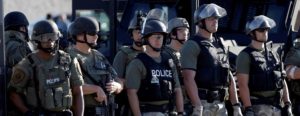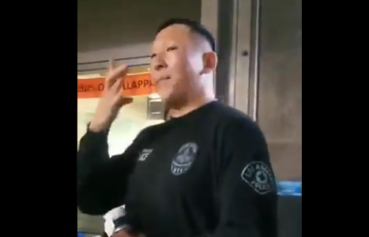
That’s part of the advice delivered by Richmond (California) Police Chief Chris Magnus, whose force patrols a city of 107,000 people and hasn’t killed a civilian in five years. Magnus spoke to Vox.com and offered a set of recommendations for how police forces can approach their job differently to reduce violence against civilians.
The advice comes in the midst of national hand-wringing about the overuse of force by police departments across the country that seemingly have been killing unarmed civilians all summer.
It’s advice that the Los Angeles police force might want to study: a report by a group called the Los Angeles Youth Justice Coalition revealed that Los Angeles law enforcement officers have killed nearly 600 people over the past 14 years — a total of nearly one death per week — and at least in the last seven years 82 percent were Black or Latino.
“You have to be thinking, as a police administrator, about what kind of folks you want to attract to your department, and how you do that,” Magnus said. “You look at some departments’ recruiting materials, and you see guys jumping out of trucks in SWAT gear and people armed with every imaginable weapon. There are clearly situations where that is a necessary and appropriate part of police work. But having said that, that is by far and away not the norm.”
“My goal is to look for people who want to work in my community, not because it’s a place where they think they’re going to be dealing with a lot of violence and hot chases and armed individuals and excitement and an episode of Cops or something,” he said. “I want them tactically capable to handle situations like that, but I want them to be here because they’re interested in building a partnership with the community. They’re not afraid to have a relationship with the residents that they serve, in terms of getting out of the car and talking to people. Those are messages that have to be sent early on, before people even get hired.”
Magnus said officers need to be trained in how to make good decisions, which involves training them how to act under stress.
“How and when do you consider the use of deadly force? What are the other options that were available to you?” Magnus sad. “There are still a lot of police academies in this country, whether they’re through police agencies, colleges or other institutions, that are probably not as far along as they should be in some of these areas. As a field, we can do better.”
Many of the recent explosive incidents that have inflamed the country involved police killing teenagers or mentally ill people. Magnus said departments need to be intentional about preparing officers to deal with these populations.
“We’ve done quite a bit of training, with our school resource officers and our juvenile detectives, about some of the better ways to communicate with youth — what approaches might be most appropriate if you have to use force,” he said. “Some of that’s really about brain development, and we’re learning that young people really do respond differently than adults do.”
“We do a lot of training dealing with the mentally ill. We have officers on all of our shifts who have gotten even more detailed and involved training — crisis intervention training — dealing specifically with mentally ill individuals. That covers understanding what the signs are that someone may be in a mental-health crisis, understanding about medications and the impact of those medicines that a lot of folks might be on, understanding what happens when they’re not taking their medication, and getting better knowledge on how to interact or engage with people who are in crisis.”
Magnus also said the training doesn’t stop when officers leave the academy and are out in the street.
“Our officers go through what is anywhere between six and eight months of additional training once they hit the streets,” he said. “That involves being teamed up with other officers who are trained as trainers, and who provide them with ongoing and regular evaluation about what they’re doing and help them learn from their mistakes in a more controlled setting.”
Among Magnus’s additional recommendations are to remember that you can kill someone with a Taser, deal with officers who use excessive force — before they become a problem — don’t be afraid to fire officers who aren’t cut out to be police officers, and police departments need more resources to do sufficient training.


